What Pound Test Leader For Trout
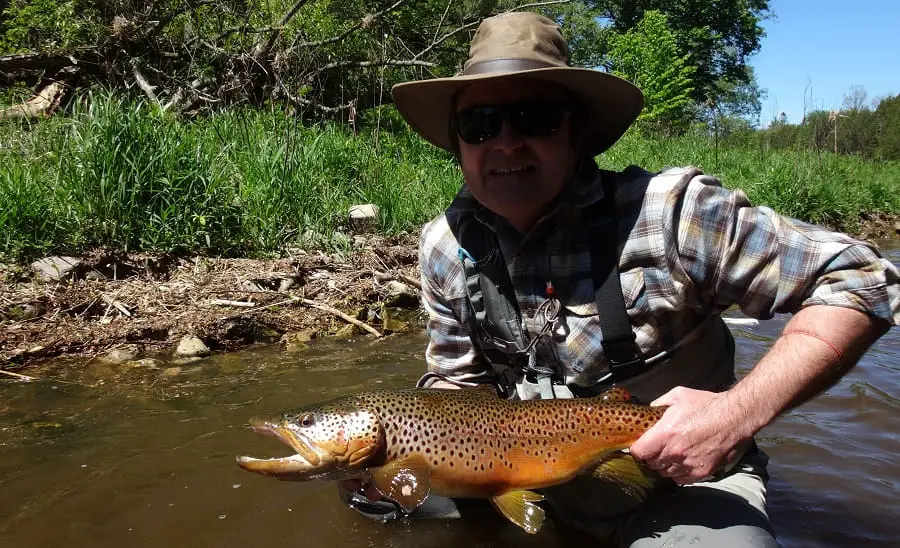
I guide many clients to big brown trout like the one my client is holding in the picture above. To catch trout like this, it’s very important to know what pound test leader to use.
The best leader size for trout for slow presentations and with bait or flies is a two-pound to four-pound leader, which is around 0.14mm in thickness, and for lure fishing, you want to use an eight to ten-pound leader, which is 0.22mm in diameter.
This is just a general recommendation. I use different sized trout leader based on the conditions and the size of the fish.
The size of the leader is critical. I use the lightest leader possible whenever I can for many reasons.
PRO TIP: It’s best to purchase your leaders based on the diameter of the leader and not based on the pound test listed on the spool. It’s also best to use a fluorocarbon leader and not mono.
We may make a small commission from some of the links on this website, which is at no cost to you. I appreciate your support.
- More Bites: A light and thin leader is less visible, and therefore it’s less likely to be seen by trout, which means the trout are more likely to grab your bait.
- Better Presentation: A lighter leader will allow your bait to drift more freely in the current. It will also allow your bait to sink deeper and faster, and it won’t get pushed by the current, which means your bait will move at a more natural speed. All of this means more hookups.
- Break-Offs: You want a leader thick enough to prevent you from breaking off a lot of trout, but still light and thin enough to not deter trout from biting.
- River Speed: In faster currents, I use heavier leaders to help land the fish, but also because the trout is less likely to notice a thicker leader if it is moved faster. In also water, I go as light as possible because the trout have more time to inspect the bait and notice the leader.
- Logs and Rocks: When fishing areas with lots of potential snags and obstructions like log jams that the fish can get into, I will go with a slightly heavier leader.
- Size of Trout: You will need to upsize the leader depending on the size of trout in the waterbody that you fish.
Best Leader Brands
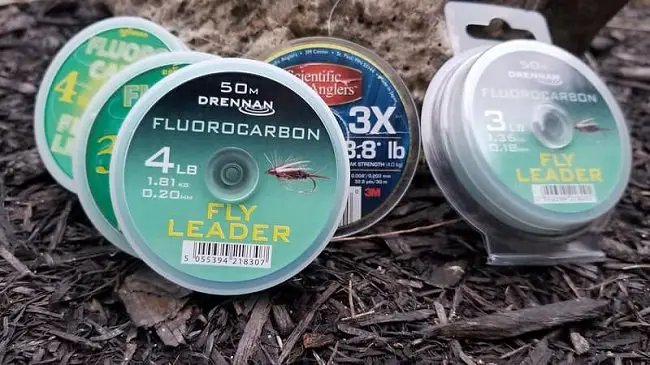
This is very important to know and is something most anglers don’t know.
Using the right size of leader has many advantages, but not all leaders are labeled properly.
I have seen anglers struggle to catch trout for years simply because they didn’t realize that the leader they were using was mislabeled or to heavy. Once they figured out the leader was the issue they were able to catch trout.
I always tell my clients that it’s always better to buy your trout leaders by the diameter size and not by the pound test on the label. It’s very important to remember this.
Most of the time, the diameter size is a more accurate reflection of the true breaking strength of a brands leader. And even if it’s not, when it comes to leader size and actually getting trout to bite, what really matters is the thickness of the line and not the pound test of the line.
This chart is based on actual tests and is a more accurate way to buy your leaders.
Pound Test | Diameter |
1.5 | .003in (.08mm) |
2 | .004in (.10mm) |
3 | .005in (.12mm) |
4 | .0055in (.13mm) |
6 | .007in (.18mm) |
8 | .008in (.20mm) |
10 | .009in (.22mm) |
12 | .010in (.25mm) |
- Sunline Super FC Sniper Fluorocarbon Line – is a popular line and the 3-pound is excellent for small stream trout when using bait or flies.
- Drennan (buy them by the diameter only)– Check Best Price at FishUSA.com
- Redwing Phantom – Check Best Price at FishUSA.com
- Seaguar AbrazX Fluorocarbon I use mostly 6 pounds, which is 0.20mm – Check the Best Price at FishUSA.com Or Amazon Price.
Don’t forget to check out our newest page Trout Fishing 101: Learn Guide Tips And Tactics For More Trout, where I share tips and advice from guides so you can learn how to fish for trout better.
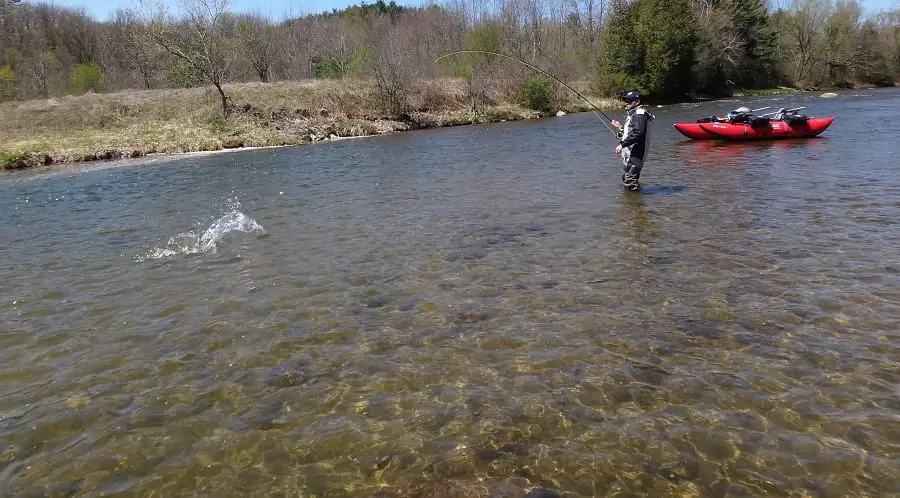
Why The Rod Makes A Difference
Longer and lighter rods allow me to use lighter leaders because the longer rod acts like a big shock absorber that protects the leader from breaking.
Using shorter and stiffer rods might require you to be more careful and lighten up on your drag a little so you do not break off. Lighter leaders tend to break more often on short stiff rods.
I discuss rods on my page, Best River Fishing Rods: Trout And Steelhead Rods
The Advantages Of Using A Lighter Leader For Trout
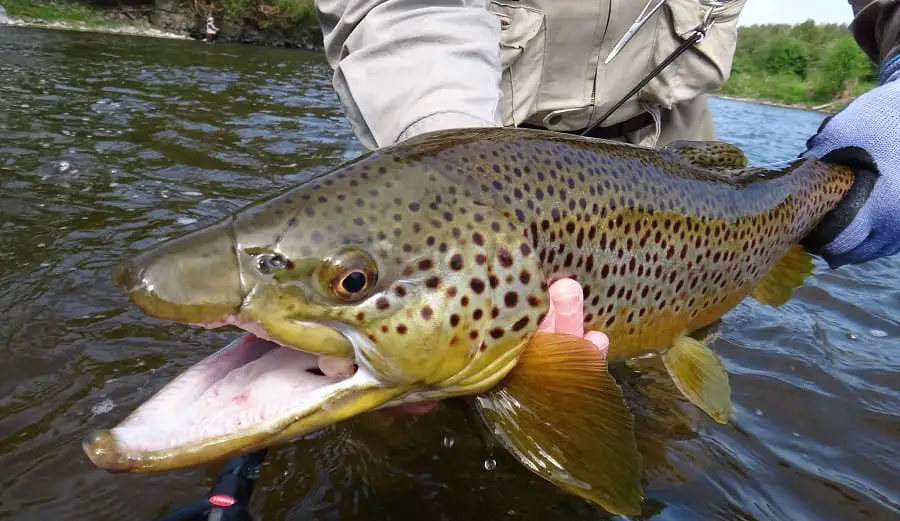
There are some real advantages to a lighter trout leader and some advantages you probably do not know about. I always use the lightest leader possible, and many of the tournament pro anglers use leaders as light as two pounds.
- A lighter trout leader won’t be seen by line-shy fish.
- A lighter trout leader will sink faster.
- A lighter trout leader won’t get pushed around by the current, and your bait won’t move abnormally fast.
- A lighter trout leader might allow your bait to move and drift more naturally in the current.
What Size Leader For Trout Is Best In Clear Water?
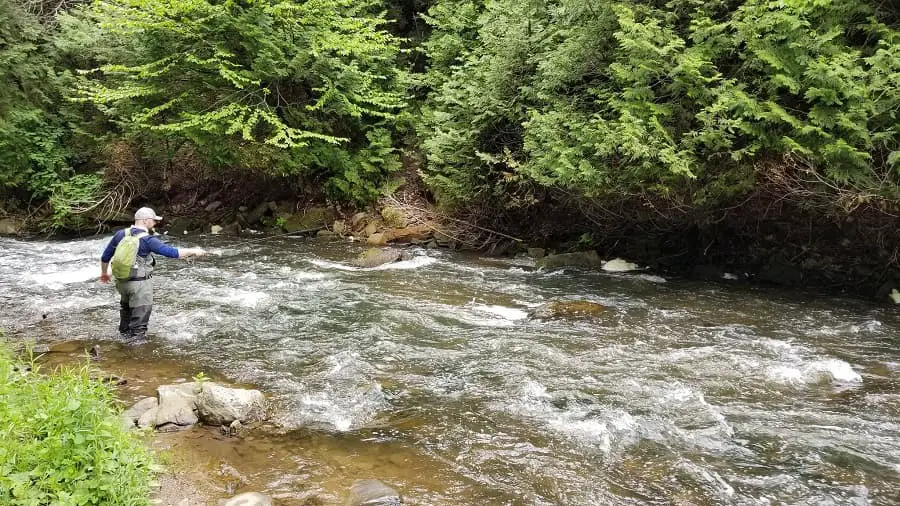
In ultra-clear rivers, a two or three-pound (0.12mm) or 4-pound (0.14mm) leader is a good choice for trout when you are float fishing or using the bottom bouncing method.
I also use this size when fly fishing for trout.
What Size Leader For Trout Is Best In Dirty Water Water?
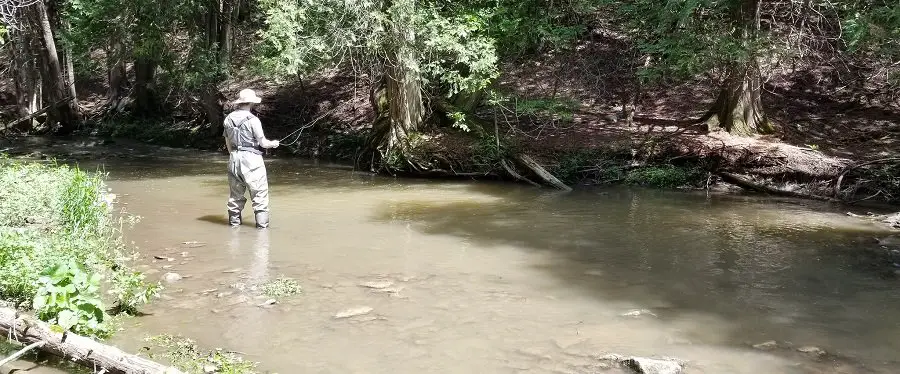
In dirty water, you can go up a size or two because the trout can’t see the line, and using a slightly heavier line will allow you to get the trout in the net faster.
Dirty water makes it harder to see rocks and snags, and a heavier line won’t scratch or break as easily when you hit these obstructions.
Therefore, the best pound test leader for trout in dirty water will be a four to 6-pound leader.
What Trout Leader For Trout Is Best In Slow Water?
I treat slow water the same way I treat very clear water, because in slower water, the trout have more time to inspect the bait, and they are more likely to see the line and refuse your bait.
Therefore, the best leader for trout in slow water will be a two to three-pound leader. 3 pound is .005″ or .12mm diameter
What Leader For Trout Is Best In Fast Water?
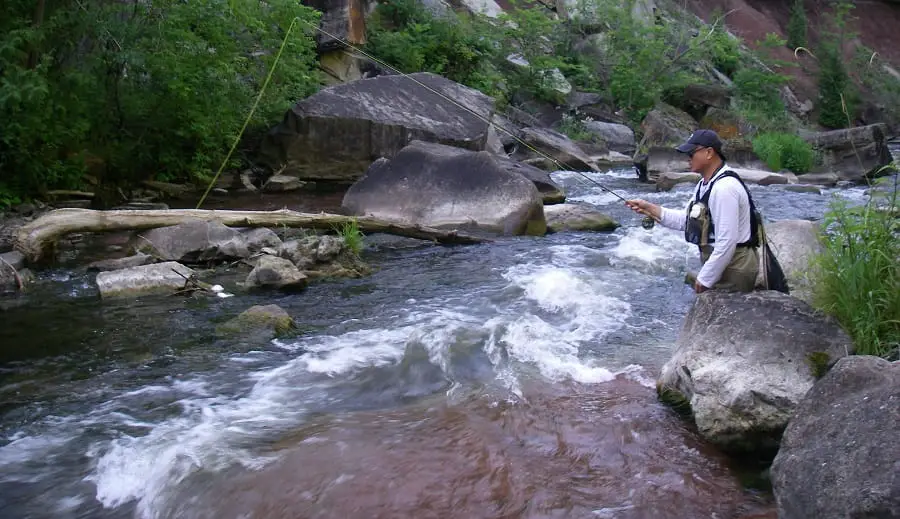
When the water is faster, the trout have less time to react to a bait moving at them and they have less time to see the line. Therefore, in faster water, a 4-pound to six-pound leader should be fine for trout. The 4-pound line is .0055in or 0.13mm to 0.14mm in diameter.
With that being said, I still use a 3-pound line more often, even in faster water because the 3-pound line won’t get pushed as fast by the current, which allows my bait to travel slower, and this often results in more bites.
Therefore, the best size leader for trout in fast water will be a three or four-pound leader.
What Trout Leader Size Is Best In When Euro Nymphing?
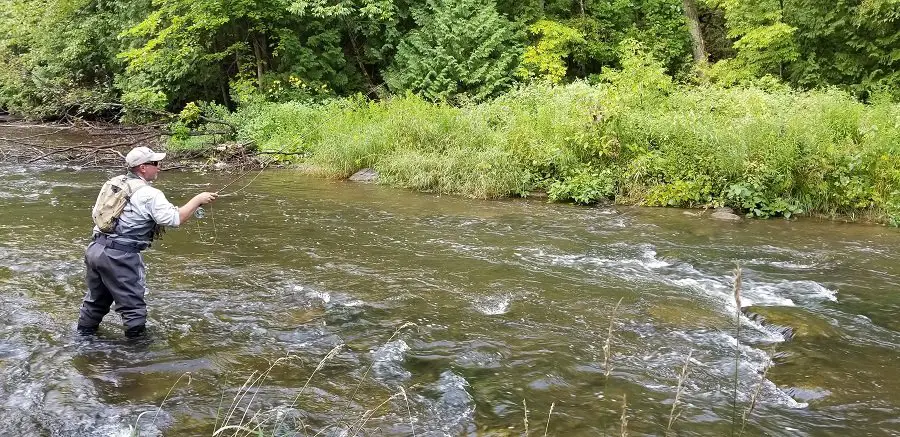
Many professional tournament anglers that use the Euro nymphing methods will use very light leaders for trout.
They do this because it allows their flies to sink faster, which gets the flies in the strike zone faster, and the thinner leader slows the flies down. It’s not uncommon for tournament pro anglers to use 1.5 to 2-pound leaders for trout. Two pound leader is about 0.10mm.
For most of my Euro nymphing fishing and guiding, I use 3-pound leaders, but I will upsize to a 4 or 5-pound leader in heavily wooded water, or if there are a lot of big fish over 5 pounds.
What Leader Size Is Good For Indicator Fishing?
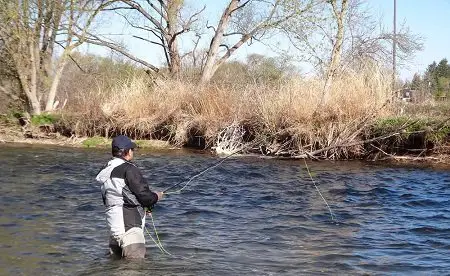
For indicator fishing for trout, a 4-pound 0.13mm to 0.14mm leader will work in most river situations.
I use 4 pounds if I want to put split shots on the line because the split shots are less likely the damage a thicker line.
If I want to get my fly deeper faster, I will drop down to 3-pound leaders for trout.
For information on how to indicator fish better, check out my page Indicator Nymphing: 13 Tips From An Expert River Guide.
What Leader Is Best For Dry Fly Fishing?
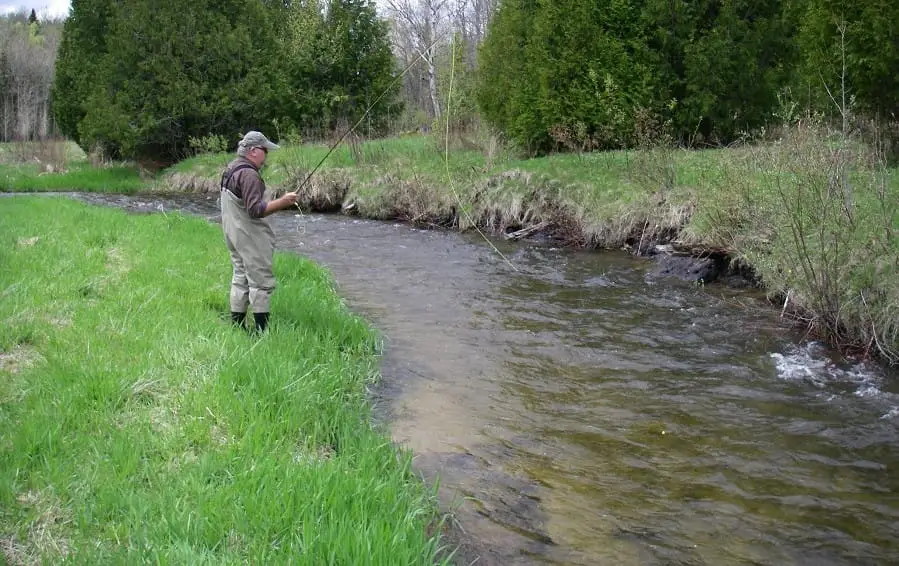
Leaders on the surface can create an indent in the surface that trout can see. That is why most dry fly fishing usually requires a thinner line so the line-shy trout will not see the line.
I also use mostly monofilament leaders when dry fly fishing because they are light and they float. Fluorocarbon lines are not good for dry fly fishing since it sinks, which could pull your floating fly under.
Therefore, the best size leader for trout when dry fly fishing will be a two to 3-pound leader.
What Leader Strength Is Best For Streamer Fishing?
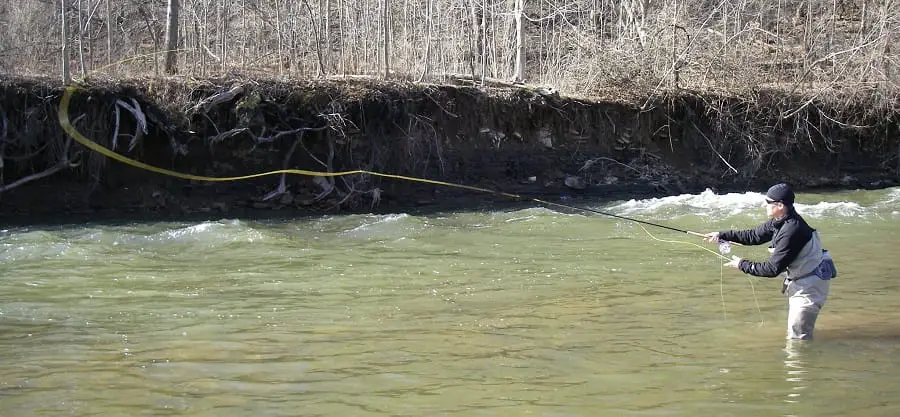
When using streamer flies for trout, I will use 10 to 12-pound leaders (0.22mm to 0.24mm).
Because the fly is moving faster, the trout will be focused on the fly and are less likely to see the leader.
The other reason I use a 10-pound leader for streamer fishing is that streamer fishing often gets the bigger fish to bite, and when they hit the fly they hit it hard and fast.
A hard-hitting trout can break a six or 8-pound leader on contact.
What Leader Strength Is Best For Swinging Wet Flies?
When swinging wet flies for trout, the line is mostly tight and the fly is moving, and there is less of a chance that the trout will see the leader.
Because the fly is moving and the leader will be tight, I use 6-pound 0.18mm leaders when fishing with wet flies.
What Pound Leader Is Best For Lures?
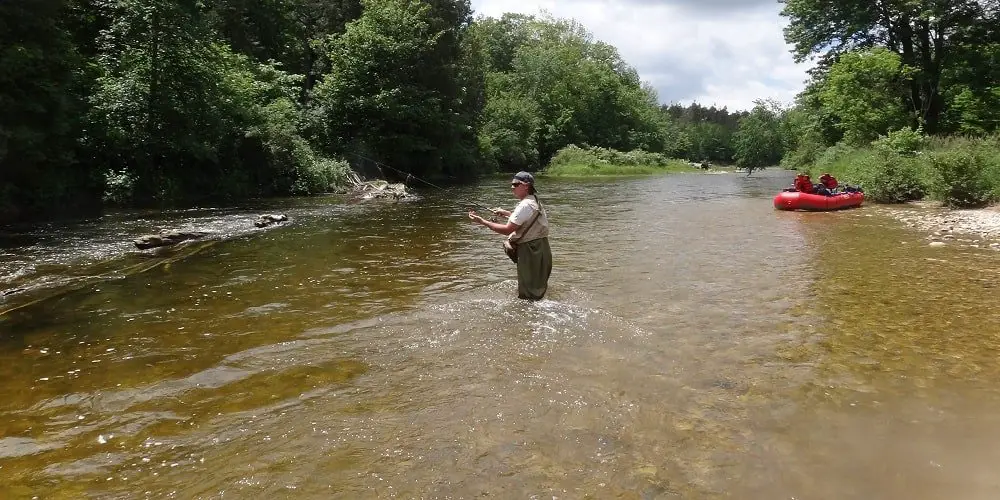
When you are lure fishing you might be using a braided line or a colored line, and you may need to add a piece of leader so that the trout don’t see it.
Because the lure is moving faster you will need a leader of 6 to 8 pounds. 0.18mm to 0.20mm
Most of the time, I will use a true 6-pound 0.18mm leader for trout when casting lures but I will up-size to a 10-pound .009in (.22mm) leader for bigger trout or faster water.
There you have it, adjust your leader size based on the conditions, and always go as light as possible.
Tight lines
Graham
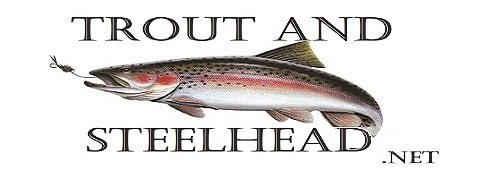
Hi Graham,
Thanks for all of the info you are sharing on the site. Amazing stuff!
I like to use an ultralight rod and reel for medium and small creeks.
If I am using spinners or micro jigs, is it ok to just go direct from mainline without a leader? I use p-line floroclear 4lb. (.18mm)
I recently downsized to 2lb floro and got burnt on a large trout that easily snapped the line, so I plan to go back to 4lb.
Thanks,
Matt
Hey Matt, When using lures that move quickly the trout are less likely to see the line so with lures I will often upsize my line to 4 or 6 pound test so I don’t lose fish, and it is OK to tie a your 4lb Floroclear line directly to the lure without a leader.
With slower moving baits and maybe with your micro jigs, depending on how you use them, I would tie on a 2 foot floro leader using a triple surgeons knot or a swivel or tippet ring. I use a leader because fish have more time to inspect the slow moving bait and then maybe see the line. Also, tying floro to mono just hasn’t worked well for me so I use a micro swivel for that type of connection.
Remember that your 4 pound mainline is 0.18mm and most 4 pound leader brands like Rio Fluoroflex 4.5lb is much lighter at only 0.14mm, and 2 pound leader is only 0.10mm, (depending on the brand), which is really, really thin line and is even too light for me in a lot of cases so I’m not surprised it broke on a big fish.
If you want to try a slightly lighter leader for bait fishing I would suggest dropping down to 0.16mm, or 0.14mm. (stop using the pound test rating on the spool and stick with the diameter instead) I have caught hundreds of 18 to 26 inch brown trout on 0.14mm line, however I’m also using 9 and 10 foot rods.
I’m in the middle of writing an article about catching trout in small streams and I discuss the idea of using longer rods so that you have more leader protection and more control on your presentation when bait fishing. I know this will sound odd to many guys that like their 5 and 6 foot rods for small stream trout, but the trend in fly fishing with the pro tournament anglers is to fish with 10 foot rods, even in small streams. There are many advantages to longer rods including light-leader protection which is why the pro’s use them.
There is no reason why you wouldn’t have the same benefits with a 8, 9 or 10 foot ultra-light spinning rod. However, if you’re primary means of fishing is casting lures a shorter rod in the 7 foot range may still be a better option. The new page should be published on May 7th 2021
Thanks for the reply Graham.
Lots of great information!
I do have an 8 1/2ft St. Croix. I will try switching over to that!
The idea of a longer rod to support the lighter line makes perfect sense. Much like longer rods for steelhead.
Cheers,
Matt
Hi Matthew,
I live in Rawlins, WY and spend a lot of time fishing on the North Platte River. Question: on a spinning reel with braided main line and fluorocarbon leader should I use a snap swivel with spinner lures or just tie the line directly to the lure? Is so, what know do you recommend?
Thanks,
Joseph Stewart
Hey Joseph,
I would recommend a good quality snap swivel when using spinners to prevent line twist. With some spoons and crankbaits it’s not as important but with spinners it is recommended.
Good luck,
Graham